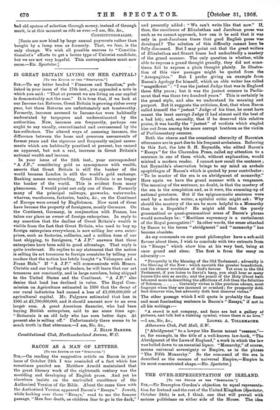BACON AS A MAN OF LETTERS.
[TO THE EDITOR OF THE "SPECTATOR.") Sta,—On reading the suggestive article on Bacon in your issue of October 24th I was reminded of a fact which has sometimes puzzled me. Matthew Arnold maintained that the great literary work of the eighteenth century was the moulding and developing of English prose. And yet he 'elsewhere insists on the unrivalled excellence of the Authorised Version of the Bible. About the same time with the Authorised Version appeared Bacon's "Essays." Jowett, while looking over those "Essays," read to me the famous passage, "Men fear death, as children fear to go in the dark,"
and presently added : "We can't write like that now." It, then, the excellence of Elizabethan and Jacobean prose was such as we cannot approach, how can it be said that it was only in post-Jacobean times that good English prose was developed ? The solution of this difficulty cannot here be fully discussed. But I may point out that the great Writers of Elizabethan and Stuart times had undoubtedly a mastery of the grand manner. The only question is whether, while able to express a grand thought grandly, they did not gonad-
times fail to express a plain thought plainly. In illustra- tion of this view passages might be quoted from the " Areopagitica." But I prefer giving an example froth Bacon's Apology for himself, which an able writer has ealled "magnificent " : "I was the jastest Judge that was in England
these fifty years; but it was the justest censure in Parlia- ment that was these two hundred years." This is certainly in the grand style, and also we understand its meaning and purport. But it suggests the criticism, first, that when Bacon called himself the " justest " Judge of his time, he must have meant the least corrupt Judge (I had almost said the best of a bad lot); and, secondly, that if he deserved this relative praise, it was hardly the " justest" of verdicts which singled him out from among his more corrupt brethren as the victim of Parliamentary censure.
Both the charm and the occasional obscurity of Baconiatt utterances are in part due to his frequent archaisms. Referring to this fact, the late S. H. Reynolds, who edited Bacon's " Essays " for the Clarendon Press, called my attention to a sentence in one of them which, without explanation, would mislead a modern reader. I cannot now recall the sentence ; but Reynolds's observation brings to my mind an archaic
apophthegm of Bacon's which is quoted by your contributor : "To be master of the sea is an abridgment of monarchy." Here again we have the grand manner with a vengeance. The meaning of the sentence, no doubt, is that the mastery Of
the sea is the completion and, as it were, the summing-up of national greatness. But if the epigrammatic sentence were used by a modern writer, a spiteful critic might ask : Why should the mastery of the sea be more helpful to a Monarchy than to a Republic ? He might add that the purely grammatical or quasi-grammatical sense of Bacon's phi-see would nowadays be : "Maritime supremacy is a curtailmeat of the Royal prerogative!" In other words, the sense attached by Bacon to the terms " abridgment " and " monarchy " has become obsolete.
As my comments on our great philosopher have a sub-acid flavour about them, I wish to conclude with two extracts from his " Essays " which show him at his very best, being at once grand and clear. The first is from the essay on adversity :-- "Prosperity is the blessing of the Old Testament ; adversity is the blessing of the New : which carrieth the greater benediction, and the clearer revelation of God's favour. Yet even in the Old Testament, if you listen to David's harp, you shall hear as many hearse-like airs as carols; and the pencil of the Holy Ghost bath laboured more in describing the afflictions of Job than the felicities of Solomon Certainly virtue is like precious odours, most fragrant when they are incensed or crushed; for prosperity doth best discover vice, but adversity doth beat discover virtue.'
The other passage which I will quote is probably the finest and most fascinating sentence in Bacon's " &hays," if not in all his writings :—
"A crowd is not company, and faces are but a gallery of pictures, and talk but a tinkling cymbal, where there is no love."
Athenzum Club, Pall Mall, S. W.
["Abridgment" to a lawyer like Bacon Meant "essence,"— as, for example, in the title of a well-known law-book, "The Abridgment of the Laws of England," a work in whieh.the law was boiled down to an essential liquor. "Monarchy," of course, means universal sovereignty or Empire, as in the phrinie "The Fifth Monarchy." So the command of the sea is described as the essence of universal Empire,-L4Empire in its most concentrated shape.—En. Spectator.]














































 Previous page
Previous page